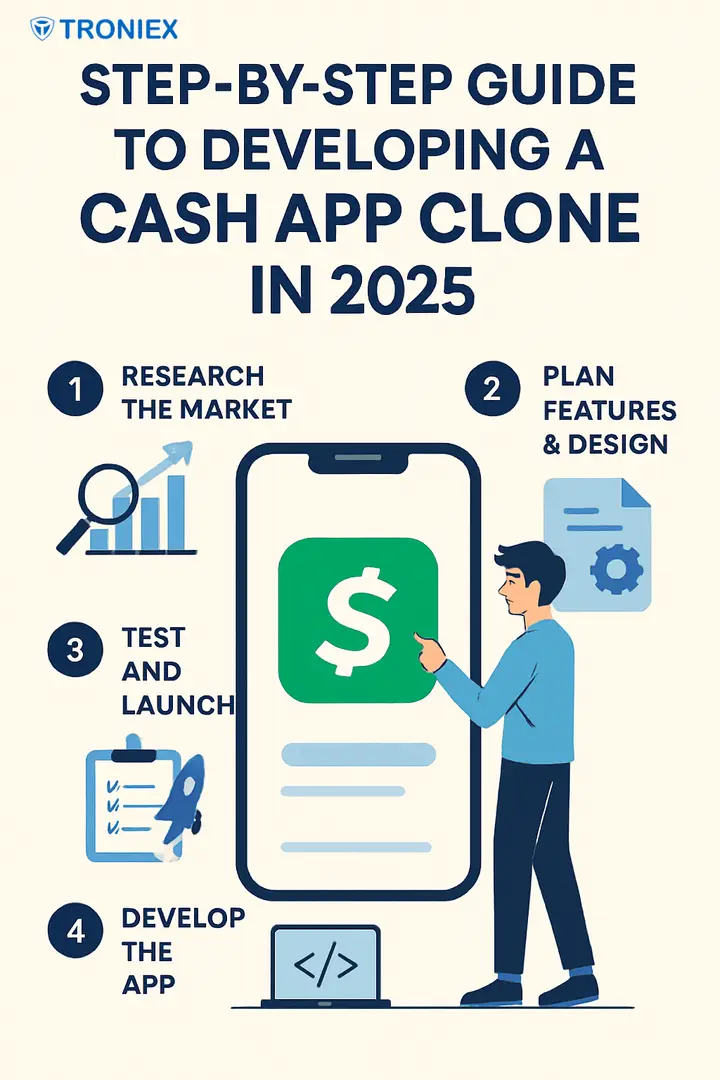

Step-by-Step Guide to Developing a Cash App Clone in 2025
The digital payment industry continues to thrive in 2025, with peer-to-peer (P2P) apps like Cash App dominating the market. Creating a Cash App clone can be a lucrative business idea for fintech startups, offering seamless transactions, bill payments, and cryptocurrency trading features. If you are looking to build a similar platform, here’s a step-by-step guide to developing a Cash App clone script in 2025.
1. Conduct Market Research and Define Your Niche
Before diving into development, analyze the digital payment landscape. Understand what features users expect in 2025, such as instant transfers, multi-currency support, crypto integration, and biometric authentication. Decide whether your clone will focus on P2P payments, business transactions, or both. Conduct competitor analysis to identify gaps that your app can fill.
2. Plan Core Features and Functionalities
A successful Cash App clone must include essential features like:
- User Registration & KYC Verification
- Instant Money Transfers and Payment Requests
- Bank Account and Card Linking
- Bill Payments and Split Payments
- Cryptocurrency Buying & Selling
- Notifications and Transaction History
3. Choose the Right Technology Stack
The technology you choose will impact performance, scalability, and security. Popular choices include:
- Frontend: React Native or Flutter for cross-platform development
- Backend: Node.js, Django, or Ruby on Rails
- Database: PostgreSQL or MongoDB
- Payments & Security: Stripe, Plaid, or custom payment gateways with PCI DSS compliance
4. Focus on Security and Compliance
Security is critical in fintech applications. In 2025, integrating advanced encryption, biometric login, and AI-driven fraud detection is essential. Ensure your app adheres to GDPR, PCI DSS, and local KYC/AML regulations to gain user trust and avoid legal complications.
5. Design a User-Friendly Interface
A Cash App clone must be intuitive and seamless. Focus on a clean UI with easy navigation, quick payment options, and responsive design. Users should be able to send or receive money in just a few taps. Personalization features like transaction reminders and dark mode can enhance user engagement.
6. Develop, Test, and Launch
Begin with an MVP (Minimum Viable Product) that covers core features. Rigorously test for security vulnerabilities, performance, and usability across devices. Beta testing with a small user group will help you gather feedback and make improvements before the official launch.
7. Implement a Growth Strategy
Once your Cash App clone is live, focus on user acquisition and retention strategies. Offer referral bonuses, cashback rewards, and loyalty programs. Regularly release feature updates and improve security measures to stay competitive in 2025.
Conclusion
Developing a Cash App clone in 2025 requires careful planning, regulatory compliance, and an exceptional user experience. By following this step-by-step approach, fintech startups can create a scalable and profitable digital payment solution that meets the growing demand for secure and convenient financial transactions.
Related Posts
© 2025 Invastor. All Rights Reserved

User Comments